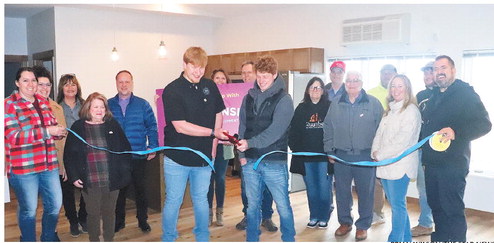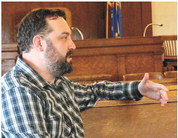School board gets update on college credit options
Members of the Rib Lake School Board were briefed at its meeting on December 12 on the 2018-2019 partnership with Northcentral Technical College (NTC).
District administrator Rick Cardey told the board the district offers different kinds of credits through the partnership. The first is Dual Credit College Coursework which allows high school students to earn both high school and college credits. He said the college courses are taught in the high school by district staff at no cost to the student or the high school for the credits.
Cardey said there are currently five faculty members teaching to NTC curriculum standards under the program in the areas of English, business/information technology (IT), math, science and manufacturing. He said last year 60 Rib Lake students took 280 credits in the dual coursework program, saving families $38,390 in tuition costs.
Cardey said the Start College Now is a program where students take college credits taught by the university while still in high school. He said it’s not easy for students to travel to a campus, so most of the courses are taught online. The district pays the tuition and an NTC grant reimburses the district for one-half of the amount. He said students took 102 credits — mostly in medical terminology, thinking critically and creatively, and psychology — last year through the Start College Now program.
Cardey said there currently are seven Rib Lake students in the welding and machine tool academies on the Phillips campus. He said its a great opportunity for students who will receive their certification the weekend before graduation and start working in the $20 plus an hour range right out of high school. Cardey later added that when a student receives their certification in a program, the district receives money. Rather than going into the general funds, he said the money goes back into the program to offset some of the costs so the district can continue to offer those opportunities to students in the future.
Cardey said the district also has a number of other partnership opportunities with NTC. He said the district takes part in a Career Coaching Program where a career coach visits the school every other month, Financial Aids Night, heavy metal manufacturing tour, Sophomore Campus Visit Day, Imagine College where eighth grade students have the opportunity to visit campus to see what college is about, welding competitions, High School Wood Sciences Day and summer school courses through NTC.
Cardey finished up his report on the NTC partnership by outlining several future program possibilities. He said the high school staff is looking at possibly offering dual credit programming in the Foundations of Teacher Education area to get students more opportunities to explore the educational field.
Cardey said the district is also looking at possible additions for summer school offerings, particularly in the area of EMT training or some other public service training. He said the third program the district is working on exploring Cengage, an online content area specific curriculum and instruction resource tool, and how it could be woven into the district’s curriculum through NTC.
The board renewed its five-year agreement with the Rural Virtual Academy (RVA) program.
Cardey said it’s a heavily-used resource with 23 students taking at least five classes through the RVA plus a number of other students taking just one or two classes. He said seven classes in Rib Lake use RVA resources as a learning tool. Cardey said because the RVA buys in bulk, the district receives a significant discounted rates on independent student learning costs. And finally, he said, the district does professional development with the RVA.
Cardey said cost to the district will be approximately $3,000 for each student in the RVA, but the district collects the entire student aid of $9,700 from the state. He said it’s been a nice partnership with RVA and recommended the board renew the agreement.
Board members Stacy Tlusty asked if high school students have the opportunity to take a required class during the summer to make their schedule work for them during the school year.
Cardey said when he was the high school principal, he gave students the opportunity to do independent learning classes. He said if a student wanted to take a history course or some other course during the summer and had a good reason and goal for doing so, the district did it as part of summer school.
Tlusty said she was thinking of a student taking a required course during the summer in order to free up time during the school year to take an additional elective course.
“I think so because what we do is advertise it as a summer independent learning academy,” Cardey replied. “I think it would be open to all interests. If kids want to learn in the summer, we’re all ears.”
Elementary principal Jon Dallmann updated the board on the timber harvest taking place in the school forest. He said the logging company has stopped cutting for the year and is approximately half finished with the project. Dallmann said the district has received a check for $8,937. He said the company will be back to finish the project after July 15 when the oak wilt restrictions have ended.
Rollie Thums said there is a minor issue with the parking lot that the lumber company was using as a staging area for the cut timber. He said they did not leave it “very well” and it was very hard to snowplow.
That issue aside, Thums thought the logging company had done a great job for the conditions they were under with the weather. He said they didn’t destroy the land with as much rain as the area had received. “They did a great job,” Thums said.
The money from the timber sale goes into a separate fund for projects in the school forest. One of the projects the district and a group of volunteers are working on is a wooden walkway supported on floating pads over a boggy area of the forest. Thums said the walkway will allow people to hike and snowshoe through the area to enjoy the beauty. Cardey added it would be a nice way to take students from science classes into a bog or swampy area to study nature without worrying about getting their feet wet or sinking in up to their knees. Thums agreed.
Board president Steve Martin said, for him, there was just a real simple beauty of being in the woods. “When you look around at everything and man had nothing to do with it. The plants and trees and how diverse everything is. Once you get that love of being in the woods, it never goes away.”




